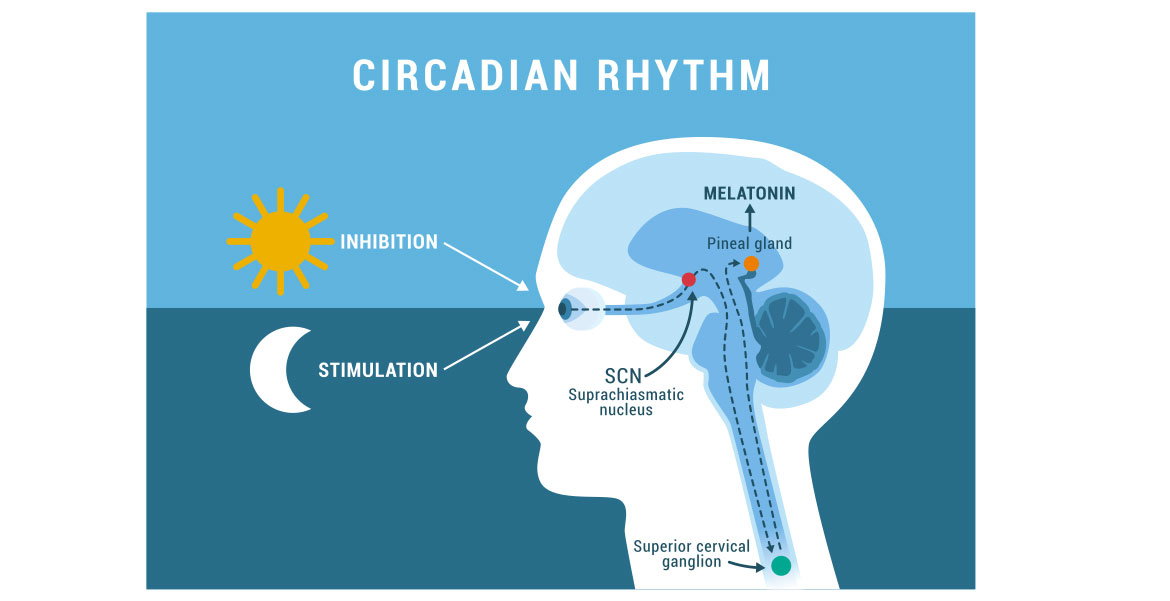Cancer Treatment and Circadian Rhythm
Circadian rhythms are physical, mental and behavioral changes that follow a 24-hour cycle. These natural processes respond primarily to light and dark and affect most living things, including animals, plants and microbes. Chronobiology is the study of circadian rhythms. One example of a light-related circadian rhythm is sleeping at night and being awake during the day.
Our circadian rhythms are controlled by the organ called suprachiasmatic nucleus, or SCN. The SCN is in a part of the brain called the hypothalamus and receives direct input from the eyes.
Can cancer or cancer treatment affect sleep?
Cancer can affect sleep. Symptoms of cancer or side effects of treatment may cause sleeping problems, reducing quality of life in people with the disease. Cancer can also lead to lasting physical and mental changes that hinder sleep, also affecting cancer survivors who have long completed treatment.
A cancer patient’s sleep may influence their response to cancer treatment and a deeper understanding of circadian rhythm may create possibilities for more effective cancer therapies.
Sleeping well may affect the way that cancer patients recover and respond to treatment. For example, poor sleep has been connected to higher levels of pain, longer hospital stays and a greater chance of complications in women undergoing surgery for breast cancer.
Research about obstructive sleep apnea and cancer indicates that the condition may make certain cancer treatments less effective. Some types of chemotherapy and radiation therapy have the greatest effect when oxygen levels in the tumor tissues are high, so hypoxia from disrupted breathing may prevent these treatments from working optimally.
Can sleep have an influence on cancer?
According to sleep foundation, it’s well-established that sleep plays a central role in human health. Given its impact on nearly all systems of the body, evidence points to various ways that sleep may affect cancer. Some of the systems that may be influenced by sleep in ways that affect cancer risk include, the brain, the immune system, the production and regulation of hormones, metabolism and body weight. Sleep may affect how cells function, altering their environment or the signals that affect how they grow.
Evidence has emerged that different components of sleep -sleep duration, sleep quality, circadian rhythm and sleep disorders can affect cancer risk. That said, studies on this topic are not always consistent or conclusive, which may reflect difficulties in accurately gathering data about sleep over the long term.
How to fix our disrupted circadian rhythm?
- Be consistent with your sleeping and waking up times: Our circadian rhythm likes routine and consistency. So, while it may be tempting to stay up late at night working, scrolling through social mediaor catching favorite shows or ‘catching up’ on sleep on the weekend, this disrupts the balance of your body clock.
Aim to go to bed around the same time and wake at the same time every day, even on weekends. If you are unable to sleep at all, consider taking a melatonin supplement by keeping your oncologist in the loop.
- Avoid using blue light at night: artificial blue light emitted from phone, tablet, and laptop screens can disrupt your internal body clock by tricking the brain into thinking it’s daytime and inhibiting the release of melatonin. As a result, late-night screen use has been found to keep you more alert and energized, making it harder to fall asleep.
Top tips for reducing the impact of blue light:
- Turn all e-devices onto ‘night-mode’ and install blue-light blocking software
- Invest in a pair of blue-blocking amber glasses
- Refrain from using technology in the 90-minute window before bed
- Avoid strong, artificial lights in the evening. Try candles or softer lamps instead
- Get some sunlight in the morning- Morning light signals to your body clock that it’s time to wake up, triggering a rise in body temperature and production of the hormone cortisol, which in turn switches on your appetite and energy. Bright light also inhibits the release of the ‘sleepy hormone’ melatonin.
- Avoid drinking coffee in the evenings: Caffeine is widely touted for its energizing and invigorating properties, namely because it blocks adenosine, one neurotransmitter that promotes sleep. The problem is, caffeine can significantly interfere with your circadian rhythm if consumed too late in the day. This is because it can take around 6-7 hours for its effects to wear off. One study found that drinking coffee 6 hours before bedtime can have disruptive effects on sleep. So, if you enjoy coffee, make sure you drink it before midday.
- Maintain your meal timings: Circadian rhythms regulate when we feel hungry and how we digest food. Some studies have found that advancing or delaying meals can alter how your circadian rhythm regulates these processes, causing you to feel alert and tired at different times than those you’ve become accustomed to. Therefore it is very important to maintain constant meal timings.
- Do not exercise too close to the bed time: Proper exercise can improve sleep quality and duration, while a healthy sleep-wake cycle ensures more strength and endurance when you work out. However, exercise is also stimulating if you work out too close to bedtime. If you find you don’t get enough sleep at night and want to reorient your circadian rhythm, try incorporating regular exercise into your routine. But as with all things related to the circadian rhythm, timing is important so do not exercise within 1-2 hours of your bedtime.
References:
https://www.naturesbest.co.uk/pharmacy/sleep-health/how-to-reset-your-body-clock-understanding-circadian-cycles/
https://www.sleepfoundation.org/circadian-rhythm/can-you-change-your-circadian-rhythm
https://www.ncbi.nlm.nih.gov/pmc/articles/PMC3856231/
Tags: Circadian rhythms, 24-hour cycle, natural, light and dark, Chronobiology, circadian rhythms, suprachiasmatic nucleus, SCN, hypothalamus, cancer, , cancer treatment, cancer patients, chemotherapy, radiation therapy , sleep foundation, sleep duration, sleep quality, circadian rhythm, sleep disorders, Be consistent , sleeping and waking up times, melatonin supplement , blue light at night, , hormone cortisol, coffee in the evenings, Maintain your meal timings, exercise, cancer, immune









